November 4th, 2008[Rails Summit Latin America] Conference Report
I’ve finally settled down in London and took some time to start the conference reports from the last couple of weeks. The first one I attended in São Paulo was Rails Summit Latin America. It was very well attended (500+ participants) and organized. I should give a special thanks to Fabio Akita and Locaweb for putting such a great conference together!
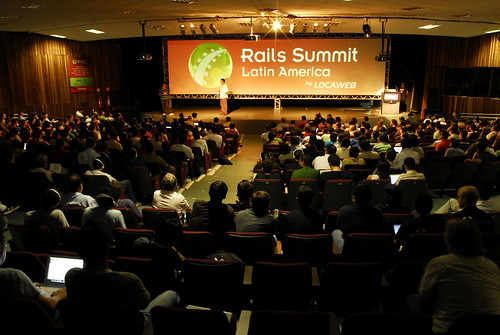
The conference started a bit earlier to me, when we went out with the other “foreigner speakers” (that’s how non-Brazilians are called in the airport…) to eat Feijoada and drink Caipirinha! Lots of fun! It was really cool to hang out with George, Jay, Obie, Desi, Dr. Nic, Chris, David Chelimsky, Luis Lavena, Akita, and Tim.
The first day of the conference started with DHH’s remote Q&A session, which was OK but nothing new or exciting. The following talk was really good: Chad Fowler gave an inspiring keynote about “Being Remarkable” which was a good summary of his book, plus his skills as a presenter and a good deck of slides (and videos). Very good!
Me and George skiped lunch to rehearse and give some final touches on our presentation about REST. I thought the presentation flowed very well, and it ended up being the only technical session on the main stage during the first day, even though we didn’t show any code: our goal was to talk about REST as an architectural style, basically summing up the great work of Fielding and the good practices that people on the REST community have been talking about. We also wanted to talk about other alternatives to building services on the internet. The slides are available here (we added some notes to make it easier to follow our train of thought).

Dr. Nic gave a funny and entertaining presentation about contributing to Open Source projects and the “Path to Awesomeness”. The first day finished with Chris’ keynote, which was very similar to the one he presented at Ruby Hoedown. If you’re interested, watch it on Confreaks. After his talk, Fabio moderated the Birds of a Feather session (which was more like Lightning Talks), and I was very surprised to see a lot of people stepping up to talk in their 5 minutes slot. The topics ranged from politics to organizing a study group, with special kudos to the Phusion guys who showed a Brainf*ck interpreter in Ruby. Of course, the day couldn’t finish without a rodÃzio of Brazilian steak at the churrascaria.
On the second day, I experienced the great joy of São Paulo traffic and didn’t made it to watch the Phusion guys’ presentation. I’ve heard from a lot of people it was great and that they gave a great talk about scalability (as well as a lesson on how to use Keynote properly). I arrived during Charles Nutter and Thomas Enebo’s talk about JRuby. It was held remotely and I know Akita had a lot of work to get the environment working. In the end, we still experienced some latency issues but the demos worked out quite OK. After that, Jay gave an interesting talk about the “Immaturity of Testing”, which was rooted in a last-minute presentation we put together for the UK ThoughtWorks Away Day back in June with George. It was great to see how much the discussions from our internal session enhanced the overall message and how Jay managed to put it all together in a nice format. I think a lot of people learned from the pros and cons that he discussed.
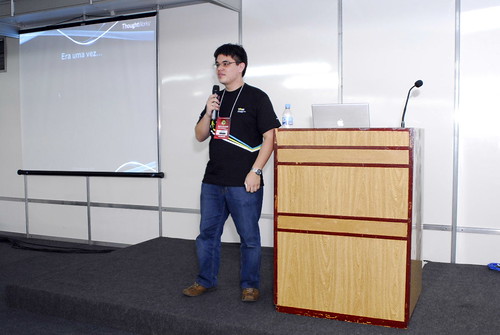
After lunch, the ‘testing’ theme continued with David Chelimsky presenting a double talk on RSpec and Cucumber, the gem that’s being developed by Aslak right now and will eventually replace RSpec’s current Story Runner. I wasn’t present during the second half, because I was preparing to present next about my lessons learned about testing. The slides (in Portuguese) are also available and I received some good feedback about it from the brazilians who prefered to watch me instead of David :-)
I stayed around the Brazilian track to watch my friend Fabio Kung present on JRuby and give a real-life demo of his experiments with JMagLev. After that, we all went to watch the closing keynote, by Obie Fernandez. It was a great talk about the Hashrocket way, which was heavily based on their way of applying Agile. In the end, he managed to get standing ovation from some folks in the audience. The last day finished with a lot of champagne and free beer, closing two days of networking, fun, Ruby, and Rails.
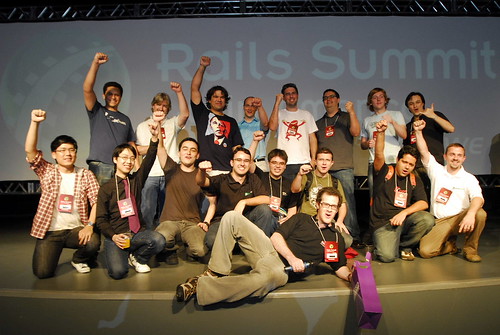
My overall impressions from the conference were very positive. It was great to see how much the Brazilian Rails community has grown over the past year. When Fabio and I organized the first RejectConf, back in 2007, we managed to get 100 people to show up in a Saturday and that triggered a lot of other small local conferences throughout Brazil. Seing everyone together for the first time, was a great chance to do the usual networking, and to share our experiences working with Ruby and Rails. I suspect next year’s conference will be even better. See you there!

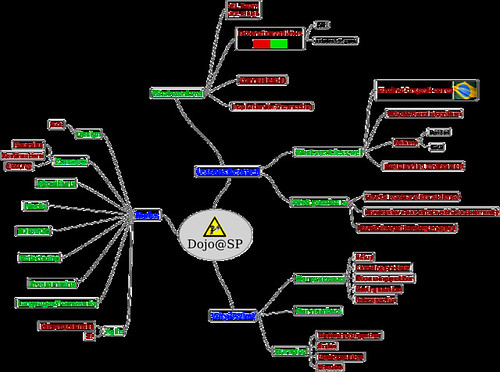

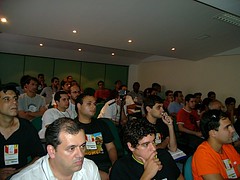
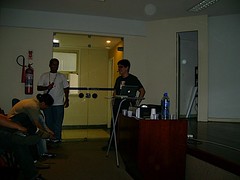
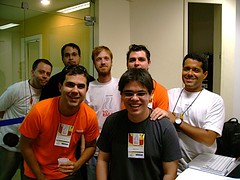


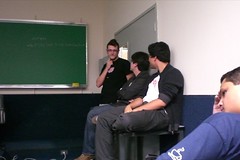
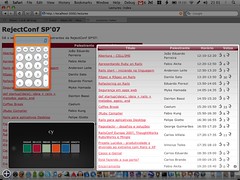
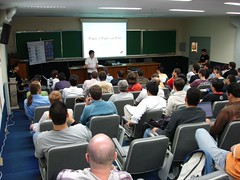
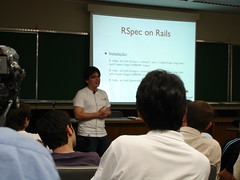






 Twitter
Twitter LinkedIn
LinkedIn Facebook
Facebook Flickr
Flickr